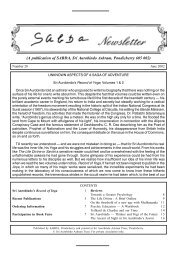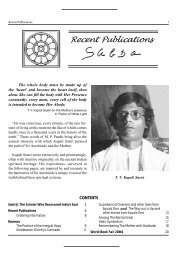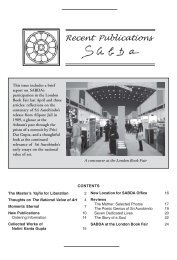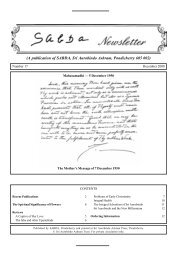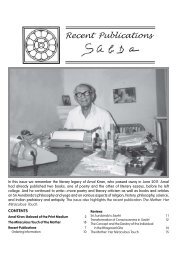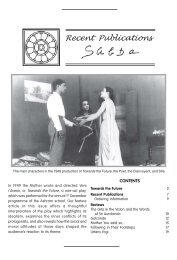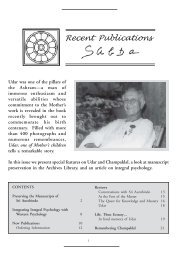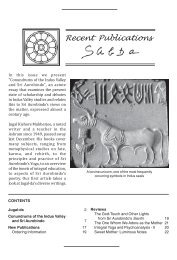Recent Publications - Sabda - Sri Aurobindo Ashram
Recent Publications - Sabda - Sri Aurobindo Ashram
Recent Publications - Sabda - Sri Aurobindo Ashram
You also want an ePaper? Increase the reach of your titles
YUMPU automatically turns print PDFs into web optimized ePapers that Google loves.
14 <strong>Recent</strong> <strong>Publications</strong><br />
been compiled earlier in <strong>Sri</strong> <strong>Aurobindo</strong> on Himself<br />
and on the Mother and in one or two other books, this<br />
volume presents several items hitherto unpublished in<br />
any book. This apart, what imparts to the volume a<br />
new character is its editorial arrangement and<br />
cardinally important footnotes.<br />
Most of the items are <strong>Sri</strong> <strong>Aurobindo</strong>’s letters, written<br />
to a wide range of people including seekers, his<br />
associates in the earlier<br />
phase of his life and his<br />
relatives, as well as to<br />
political personages<br />
including Bipin Chandra<br />
Pal, Joseph Baptista,<br />
B.S. Munje, C.R. Das,<br />
S. Radhakrishnan,<br />
Morarji Desai, Surendra Mohan Ghosh, Kailash Nath<br />
Katju and K. M. Munshi. The communications are<br />
personal, yet what arise from them are transpersonal<br />
illuminations.<br />
Issues which had remained a question for many –<br />
such as <strong>Sri</strong> <strong>Aurobindo</strong>’s unwillingness to see Gandhiji<br />
despite the latter’s eagerness for it – get explained<br />
through <strong>Sri</strong> <strong>Aurobindo</strong>’s own words. Those who think<br />
that there was no difference between the political<br />
ideologies of <strong>Sri</strong> <strong>Aurobindo</strong> and Tilak should feel<br />
enlightened in reading <strong>Sri</strong> <strong>Aurobindo</strong>’s letter of<br />
December 1, 1922, to Barindra Kumar Ghose. This<br />
was in response to Barindra Kumar informing him<br />
that C.R. Das proposed to publish a portion of a letter<br />
he (Das) had received from <strong>Sri</strong> <strong>Aurobindo</strong>. Out of<br />
context, the passage intended to be reproduced could<br />
mean that <strong>Sri</strong> <strong>Aurobindo</strong> supported some policies of<br />
Gandhi or of Tilak. But, says <strong>Sri</strong> <strong>Aurobindo</strong>: “My own<br />
policy, if I were in the field, would be radically different<br />
in principle and programme from both, however it might<br />
coincide in certain points. But the country is not yet<br />
ready to understand its principle or to execute its<br />
programme.”<br />
There are his observations on the Second World<br />
War, Cripps proposal, Wavell Plan, the assassination<br />
of Gandhi-ji, etc. that by now are widely known, but<br />
put together, they give us a firm angle to look at the<br />
situations of those days.<br />
The Mother India that in its early phase was being<br />
published from Bombay and edited by K.D. Sethna<br />
was believed by all to be the journal projecting more<br />
or less <strong>Sri</strong> <strong>Aurobindo</strong>’s views on men and matters.<br />
Once, Sethna proposed to write a passage that ended<br />
with “till we put ourselves in the care of some Rishis<br />
among leaders”. <strong>Sri</strong> <strong>Aurobindo</strong> of course advised<br />
him to change it to “till the eyes of India’s leaders see<br />
more clearly…” etc. But feel the laughter in it: “I do<br />
not know of course who may be acclaimed as the<br />
Rishi in question,—the only one with a recognized<br />
claim to the title is not likely to be called from<br />
Tiruvannamalai to Delhi and would certainly refuse<br />
his consent to the<br />
The topics covered by the volume are varied, and<br />
a reader emerges amazed and enlightened about<br />
the incredibly wide reach of <strong>Sri</strong> <strong>Aurobindo</strong>'s<br />
comprehension and compassion.<br />
transfer. But it is evident<br />
that the eyes of your<br />
readers will turn at once<br />
towards Pondicherry<br />
and consider that it is a<br />
claim to my appointment<br />
either to the place filled<br />
so worthily by C.R. or the kindred place admirably<br />
occupied by Nehru. I am a candidate for neither<br />
office and any suggestion of my promotion to these<br />
high offices should be left to other announcers and<br />
the last place in which it should occur is Mother India.<br />
So out with the Rishi.”<br />
Some of the letters on the psychological problems<br />
of sadhaks, elaborate and pointed, are like a tender<br />
ray into the consciousness of men, a guide for<br />
introspection by seekers; for example, the letter<br />
explaining the delusions nurtured by a disciple (pp.<br />
309–12). Thus, mundane and spiritual, political and<br />
historical, the topics covered by the volume are varied,<br />
and a reader emerges amazed and enlightened about<br />
the incredibly wide reach of <strong>Sri</strong> <strong>Aurobindo</strong>’s<br />
comprehension and compassion. He knew the pits to<br />
which man could descend and the sublime heights<br />
one could touch. But a feeling the reader has is: he<br />
was constant like the polestar in his vision of man’s<br />
destiny. Suddenly, a few lines from a poem by an<br />
old, good poet, Longfellow, assumed a new import in<br />
this author’s mind:<br />
Life is real! Life is earnest!<br />
And the grave is not its goal;<br />
Dust thou art, to dust returnest,<br />
Was not spoken of the soul.<br />
— Manoj Das<br />
Shri Manoj Das is a well-known writer. A Padma awardee, he<br />
is a recipient of the Saraswati Samman and Sahitya Akademi<br />
award.<br />
see page 7 for pricing and other information



